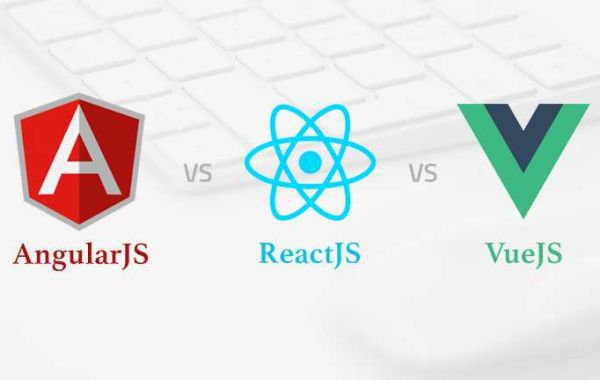Javascript is one of the most popular languages among companies these days. Many professionals and entrepreneurs love to build their applications or projects using this technology.
However, there is confusion when it comes to choosing the most suitable environment for their software development project. That in itself is a project!
Choosing a javascript framework is quite a challenge. If you try to delve deeper into these frameworks, you will surely find several reasons for each of them.
Let's start with Angular? Because it is the oldest and most complete version. Or maybe you should choose React.Js! People love apps developed with this framework. Wait a second! What do we have now - Vue.Js? This is a new framework, so it can be much better than others...
Let's take a look under the hood of each of them to better understand these frameworks. We hope to shed some light on the choice of these famous javascript frameworks and how they differ from each other. Let's start….
Comparison of Javascript frameworks
Remember that this is just the starting point for all three frameworks. Talking about similarities (as we stated above) ends with us learning about the three front-end javascript frameworks, the syntax of the language, and their impact on the learning curve.
Angular as a framework uses TypeScript. It is a superset of Javascript, another programming language. TypeScript gives you several benefits such as autocomplete and navigation. It also has advanced refactoring options.
Companies that make TypeScript the go-to choice for their large-scale software development projects can't get started right away if they don't know about the framework. Working with TypeScript does require a lot of learning.
On the other hand, React is much easier to work with. This framework uses its own syntax known as JSX- which is not as cool as TypeScript to begin with.
Vue.Js is a breeze compared to Angular and React. This structure works effectively with template-based syntax. In addition, code generated with this framework can be easily integrated into an HTML file with any external transformations.
Back to learning, Angular and Vue are known for their compact but amazing documentation, while Reacts is somewhere far behind.
Let's now move on to the important features of Angular, React, and Vue.Js to understand what is appropriate, when, and for what project.
To focus on which software development frameworks to learn and work on, you need to have the following understanding.
External framework size
When it comes to a software development project, the size of the framework matters. This is because front-end frameworks are directly related to the performance of your product. Also, you need to download the application and the framework long before the application becomes operational.
Here Angular is the heaviest of the others (around 143K), followed by React (around 43K) and Vue.js is the lightest of the bunch and only goes up to 23K in size. Remember that having a great web application without complex features is useless. Therefore, it is recommended to choose a smaller frame.
Performance Based Comparison
When developing web applications, the performance of a product is directly related to the DOM (Document Object Model). This model represents a web page in both web forms and code. With DOM, you can easily manage your web pages in case of any updates.
Angular usually uses regular DOM. It only redraws if there is one change. That's his Achilles heel! Well, simply because plain DOM has a big impact on the performance of your application, especially when it comes to Single Page Web Applications.
In this case, both React and Vue.js are quite robust because they use a virtual DOM. Here you can make changes without affecting the DOM or any other feature in the application.
The virtual DOM is compared to a snapshot of the regular DOM, and then only changed elements are re-rendered. This approach improves application performance.
Scalability
In front-end software development, scalability means the ability to maintain and extend functionality. Web applications tend to grow in size and functionality over time, and the development environment must support this technical growth.
The developer community is unanimous when it comes to Angular and React. Angular offers scalability along with a modular development structure. Whereas React provides a component based approach with equally great results.
Vue.Js is a bit lacking in this regard, as it uses a template-based syntax. When working on a large-scale project, templates are difficult to reuse, unlike other JavaScript elements.
Common technologies used
Angular, React and Vue are used to build Progressive Web Applications (PWAs). Such applications are web applications that smartphone users can access as shortcuts to their screens. PWAs are often similar to native mobile apps.
There are several templates available for each JavaScript platform, as well as ready-made applications. However, Angular and React have more options than Vue.
Talking about the developer community
According to the Stack OverFlow 201 survey, React was named the most loved framework among professionals. Created directly by Facebook, this framework enjoys unrivaled popularity and support around the world.
Today, React developers and their community exceed 30,000 members. And also, they all contribute to the development sector that Angular was once known for. However, according to statistics provided by Bestof.Js, the original version of Angular still has more followers than the new version. While Vue.Js is far from popular in the community. The more developers collaborate on the functionality of the JavaScript framework, the better it will get and the bigger the library will become.
But with React, you will definitely get all the reusable elements that were once added by the developer. Hence, if your team is supportive and element accessibility is critical to you and your project, React might be the way to go.
Availability of talent and demand
If you already have a team of front-end developers, your choice will be much easier. So, if you have an Angular programmer... Well, you are going to work on software development projects based on Angular Frameworks.
Here, team selection is one of the most important aspects to consider when planning a software development project. Given the high popularity of frameworks like Angular and React, you are more likely to find and hire professional developers for any of these frameworks other than Vue.Js. A Vue.js developer is somewhere in the middle, with an easy learning curve, and an experienced front-end developer will have little difficulty learning Vue.js.
Depending on your needs and project, you can either outsource software development to your team, or publish your requirements and start recruiting.
In the survey, TypeScript skills were also rated higher than plain JavaScript. Now considering the salaries, they are a bit more expensive than React or Vue.js. It has to do with the set of skills needed from a TypeScript perspective.
Global acceptance of JavaScript frameworks
No matter how perfect your Javascript Framework is, its reputation always plays a key role. In addition, when you develop a web application on a widely used and loved framework or platform, maintenance and support becomes much easier.
Let's now look at brands that are happily using Angular, React, Vue.Js.
According to some observations, if you are considering outsourcing software development, Vue.js is better known in Asia (especially China). However, in the US, the trend is reversed. Vue is not welcomed by US companies that prefer Angular.
It's clear that Angular and React have heavyweights around the world. This gives their users an extra pro-level argument. Limiting Vue to only Asian countries also wins the trust of several companies or brands such as Grammarly, WizzAir and others.
Here Vue.Js is a framework that sits somewhere between React and Angular. Vue.Js developers can be hired here https://djangostars.com/services/vue-js-development/ by the way. It is not as popular as Angular, but it certainly includes more features and functionality than React. If you're looking to hire Vue.Js developers to build apps like UberEats, GitLab, and Alibaba, don't forget to consider the features the technology has and the features it lacks.
For example, Vue.js gives you built-in state management and routers. However, it lacks validation and other client-side features.
Quick comparison:
Based on the pros and cons of these frameworks, we have listed the following criteria to help you choose the best platform for your project.
When to choose Angular?
- You are planning to start a large-scale and complex project.
- You are looking for a simple yet robust platform to improve the performance and scalability of your application.
- You have your own Angular development team.
- You can take the time to let your pros learn TypeScript well in advance of the project.
When to choose React?
- You agree with the reusable components.
- The interface of your application is not very complicated.
- You are looking for high performance and scalability.
- You have very tight deadlines
When to choose Vue?
- The scope of your project is rather small.
- You want to develop high performance applications.
- Your team has no skills, but the developers know JavaScript well.
- You don't have much time to get your team to learn a new framework.
Forecasts for the future
Well, as we all know, many open source platforms and frameworks are falling into oblivion and disappearing. Is it reasonable to be concerned about any of the JavaScript frameworks we've discussed?
Although we cannot fully predict what will happen next. The constant development and expansion of the industry is a good indicator of the future of these projects. However, popularity and growth are also critical (as we mentioned above) in predicting the longevity of a project.
Angular, React and Vue play a very active role in software development. From time to time you will find new versions of these frameworks. With amazing support and high performance, you can safely use any of these frameworks. It is very important to consider that Angular is not growing fast, while Vue or React, however, have started very recently. But these frameworks are growing much faster.








